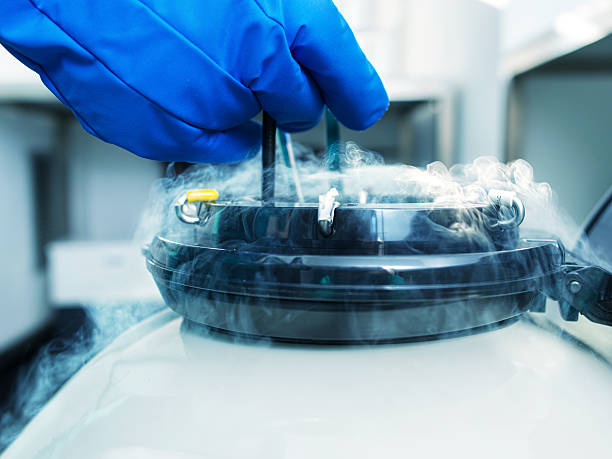Freezing Time: How Cryopreservation is Transforming Fertility Treatment
Freezing Time: How Cryopreservation is Transforming Fertility Treatment

In a fertility clinic in Lagos, the air is heavy with hope and unspoken emotions. Couples sit quietly, some holding hands, others giving soft words of encouragement to one another. On the walls are posters of smiling babies and radiant parents, with bold letters reading; “A Future Preserved.” You’re here to understand how cryopreservation the science of freezing eggs, sperm, and embryos, is transforming fertility treatment in Nigeria and remodelling not just medical possibilities but the very notion of hope itself.
In Nigeria, fertility is far more than biology; it is identity, legacy, and social currency. You have heard how families and communities wrap expectations around childbirth, and how couples facing infertility often encounter pity or blame. For many, not being able to have children is not just a medical condition; it is a cultural wound. But inside the clinic walls, a quiet revolution is taking place. Cryopreservation offers a new narrative – one where time itself can be paused, where you can safeguard your reproductive potential until the time is right. Whether it be health challenges, career ambitions, or life’s unpredictable twists and turns, it gives you free will over timing.
Cryopreservation is not freezing; rather, it is a choreography of precision and timing. Eggs, sperm, and embryos are cooled to below-zero temperatures, but unlike the frozen food in your kitchen, they undergo vitrification-a technique so fast that ice crystals can’t form to damage the delicate cells. The result is a glass-like suspension where life is safely paused. In other cases, controlled slow freezing preserves sperm or embryos, balancing survival with stability. You realize this isn’t some futuristic fantasy but is science in action, happening right now in Nigerian laboratories.
Across Lagos and other major cities, pioneering fertility centers are redefining what is possible. Specialists are guiding women through the process of egg freezing, which allows them to extend their fertility timelines without giving up on motherhood. Couples are preserving embryos after IVF cycles, avoiding the emotional and physical strain of repeated procedures. Cryopreservation merges with advanced genetic testing, ensuring only healthy embryos are transferred. Nigerian clinics are no longer merely catching up but innovating, blending global expertise with local understanding.
Envision yourself in various scenarios: being diagnosed with cancer, cryopreservation can grant you the opportunity to freeze eggs or sperm before chemotherapy starts; if you have a very time-consuming career, it could buy you peace of mind; if you are still searching for a partner, freezing your eggs would extend your window. Should you enter into IVF, embryo freezing spares you the agony of having to begin anew each time. You start to view the process of cryopreservation not only through a scientific lens but as an act of empowerment, one where the individual reclaims control over fate.
But the picture is not that simple. You ask tougher questions. What happens to frozen embryos left unutilized? Who makes the call on their fate? Is this technology accessible to the regular Nigerian or just the privileged few? How does faith stand in relation to the freezing of potential life? Questions and more questions. You begin to realize that cryopreservation in Nigeria is not simply a medical development; it’s a cultural, ethical, and spiritual dialogue unfolding in real time.
Reality kicks in when you ask the cost: Egg freezing costs several hundreds of thousands of naira, excluding yearly storage fees. IVF and embryo freezing go even higher. It suddenly becomes obvious that cryopreservation, for now at least, remains an option for a few privileged people, but there’s hope for everyone to benefit. Yet you also sense a tide turning. As more clinics invest in the technology, and as awareness spreads, costs could fall. One day, government policy or insurance cover might make fertility preservation accessible for all Nigerians, not just the rich.
In the waiting room, you meet a woman in her late 30s; she tells you how she froze her eggs five years ago and, with a new partner now, she’s finally ready to use them. The relief in her voice is palpable. A young man shares how sperm freezing allowed him to preserve his chance at fatherhood before undergoing cancer treatment. A couple beams as they describe how frozen embryos gave them a second chance at parenthood after years of disappointment. Their stories breathe life into science, turning liquid nitrogen tanks into vessels of possibility.
You envision the future of Nigeria 10, 20, 30 years later, where cryopreservation becomes routine, available in every hospital across the nation. The stigma of infertility gradually starts to wear off as science provides more answers. Women feel freer to plan their futures without fear of running out of time. Men facing illness know their dreams of fatherhood remain intact. Beyond fertility, the technology extends into organ preservation, biodiversity, and longevity research. Nigeria joins a global movement redefining what it means to preserve life.
The air is cool and welcoming as you step out into the steamy Lagos air. Somewhere, deep inside some fertility clinic, tiny seeds of life sleep in a cold tank, awaiting the perfect moment to awaken. You finally realize that cryopreservation is not just about freezing cells, it’s about freezing hope, freezing dreams, freezing the possibility of tomorrow. It’s about holding time in your hands until you’re ready to embrace the future. In that realization, you understand that Nigeria has just started its journey with cryopreservation – one frozen heartbeat at a time.



